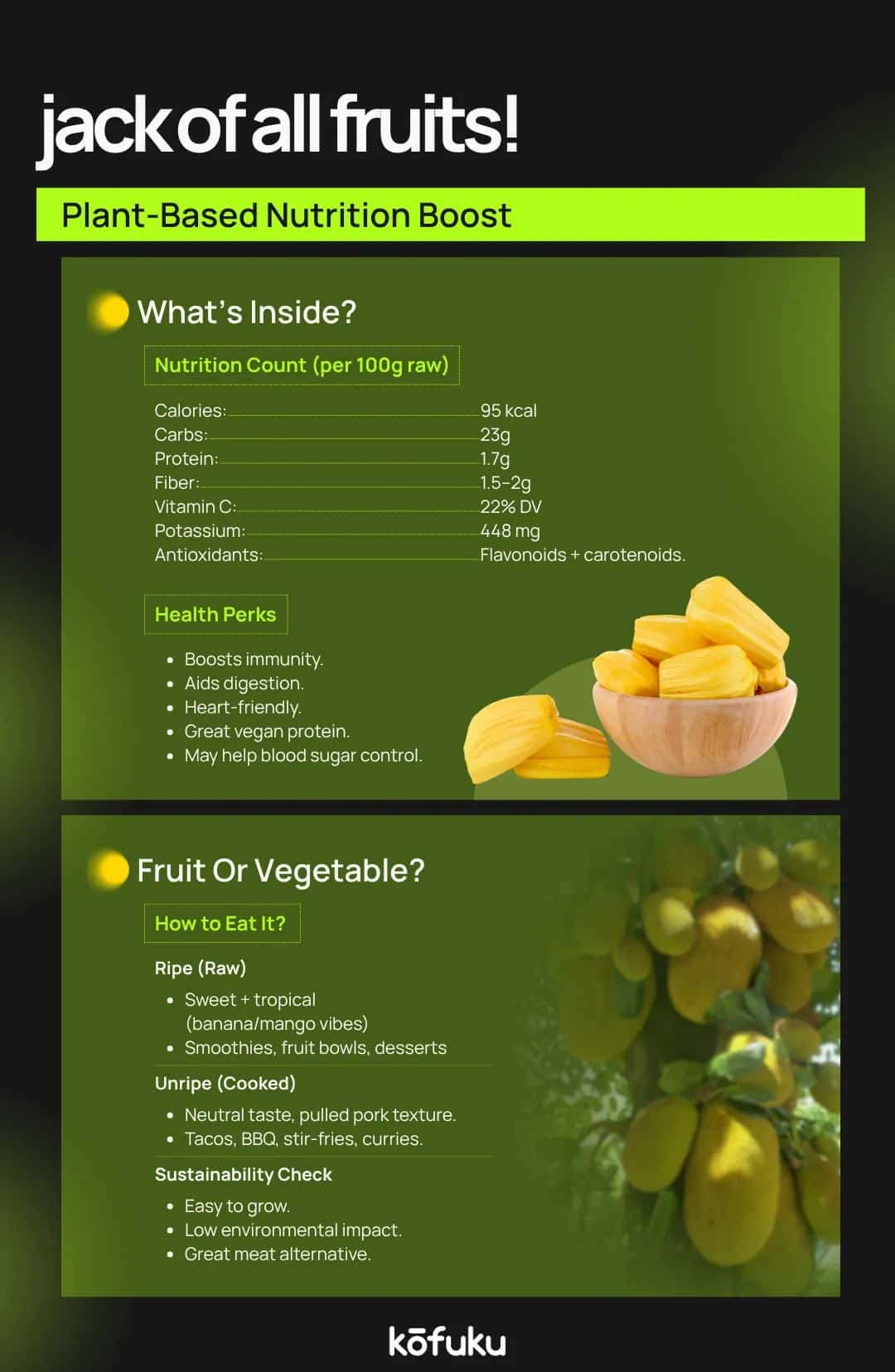Home
Blogs
Lifestyle Diseases
Why Jackfruit Is Good for You: Nutrition, Benefits, and How to Enjoy Raw and Cooked Jackfruit
Why Jackfruit Is Good for You: Nutrition, Benefits, and How to Enjoy Raw and Cooked Jackfruit


Introduction
We Indians are very good at utilising seasonal produce. We can incorporate seasonal produce in almost everything, from curries to salad, and we won't get bored. One such seasonal produce we are great at consuming is jackfruit. Jackfruit is a tropical fruit that is an indigenous and nutrient-rich food in India.
Most of us enjoy eating jackfruit on a hot summer day. In fact, when we think of jackfruit, most of us usually imagine the sweet and ripe fruits that can be used in desserts and smoothies. But have you ever heard of consuming raw jackfruit?
Well, it's not so uncommon. Unripe jackfruit forms a common ingredient of most dishes of the Southeast Asia region and is gradually gaining popularity in Western societies as an alternative to meat.
Rich in fibre, vitamins, minerals and unique plant compounds, jackfruit and its various parts, seeds, flour, and even leaves, offer impressive health benefits. Whether raw or cooked, jackfruit is emerging as a powerhouse in modern diets, especially for people looking to manage diabetes, boost energy, or explore plant-based eating.
Learn more about the benefits of jackfruit, its nutritional value, how to add it to your diet, and more.
What Is Jackfruit? Understanding This Unique Tropical Fruit and Its Parts
Jackfruit, also known as Artocarpus heterophyllus, is a tropical tree native to Asia, Africa, and South America. It comes from the same plant family as figs and mulberries.
Outside, it's tough; inside, it's fleshy with a stringy yellow interior that can be eaten raw or cooked to go with many different dishes. Its skin is green or yellow and spiky, and each of its pods has a seed that is about an inch long.
Raw jackfruit has a sweet taste and can be used as a substitute for meat, similar to tofu or tempeh. Its texture makes it stringy and, therefore, suitable for vegetarian barbecue. On the other hand, unripe jackfruit is sour and cool. The consistency is thick and solid like pineapple. It can be consumed on its own or in combination with smoothies.
Nutritional Profile of Jackfruit and Its Seeds
Jackfruit is rich in vitamin C, potassium, magnesium, fibre, and antioxidants. A 100-gram serving of ripe jackfruit provides around:
- 95 calories
- 2 grams of protein
- 0.6 grams of fat
- 3 grams of fibre
- 20–25 grams of carbohydrates
It also contains small amounts of B-complex vitamins, including thiamine and niacin, supporting energy metabolism.
Jackfruit Seeds Nutrition
The nutrition facts of jackfruit seeds are equally compelling. When cooked, these seeds offer:
-
High protein (7–8 grams per 100 grams)
-
Resistant starch
-
B vitamins
-
Iron, zinc and potassium
Nutrients in jackfruit seeds promote muscle health, gut balance and iron absorption. Roasted seeds make a protein-packed snack, while powdered seed flour can be used in gluten-free baking.

Raw Jackfruit Benefits: Why Eating It Unripe Is Healthy
Raw jackfruit- that is, the green variety that is not completely mellowed out can help people lose weight and is included in diabetic diets. Raw jackfruit has the following benefits:
-
Low glycaemic index (GI): Helps regulate blood sugar levels
-
High dietary fibre: Supports digestion and curbs appetite
-
Meat-like texture: Ideal plant-based alternative for vegans and vegetarians
-
Rich in antioxidants: Fights inflammation and oxidative stress
Raw jackfruit benefits people who want to use an alternative source of fibre to replace grains and meats that are not diet-friendly or filling. It can be added to curries, cutlets, and stir-fries, and will give you a feeling of satiety without the surge in blood sugar levels.
Jackfruit Benefits for Females: Supporting Women’s Health Naturally
Jackfruit benefits females by helping balance hormones, fertility, and preventing anaemia. The iron and B-vitamin content can also help minimise fatigue and promote healthy red blood cell production, which is important during menstruation and pregnancy.
Magnesium and potassium are beneficial in relieving muscle cramps, and the fibre component also helps relieve cramps, as well as bloating and constipation.
Moreover, the phytonutrients in jackfruit benefit the skin by promoting detoxification, resulting in healthier and clearer skin in the long term.
Health Advantages of Jackfruit Seeds and Jackfruit Flour
Jackfruit seeds offer numerous benefits, including improved digestion, enhanced immunity, and strengthened bones. Seeds are a rich source of complex carbohydrates and proteins, which help maintain energy and curb hunger.
On the other hand, jackfruit flour benefits individuals with diabetes and those who are gluten-intolerant. This flour is made by drying and milling raw jackfruit. It helps in the following way:
- Lowers post-meal blood glucose spikes
- Adds fibre and texture to chapatis, dosas, and smoothies
- Supports weight management when used in place of refined flours
Adding just 30–50 grams of jackfruit flour to daily meals can significantly improve glycaemic response.

Jackfruit and Diabetes: Is Jackfruit Good for Diabetes Management?
Is Jackfruit good for diabetes? The answer to that is based on consumption. While ripe jackfruit is high in natural sugars, raw jackfruit is diabetic-friendly due to its low glycaemic index and high fibre.
Research has shown that consuming raw jackfruit can help lower postprandial (after eating) glucose levels. The benefits of jackfruit flour are evident here, as it serves as an ideal, easy-to-use, and safe alternative to maida or atta in daily cooking.
For diabetics, it’s best to:
- Prefer raw jackfruit over ripe
- Limit portion size
- Avoid jackfruit desserts or syrup-packed canned varieties
- Use jackfruit flour in rotis or smoothies
How to Use Jackfruit Leaves and Tree Leaves in Traditional Remedies
Jackfruit leaves and jackfruit tree leaves are often overlooked but have been used in traditional medicine for generations. In Ayurveda and folk medicine, these leaves are:
- Boiled into teas to control blood sugar
- Ground into pastes for skin conditions
- Used as natural plates or wraps for steamed foods
Some studies suggest jackfruit leaves contain bioactive compounds with anti-inflammatory and anti-diabetic properties, though more research is needed.
Delicious Ways to Eat Jackfruit: From Raw to Cooked and Flour-Based Recipes
Jackfruit’s appeal lies in its versatility; it can be sweet, savoury, chewy or creamy, depending on how you cook it.
Ways to Enjoy Raw Jackfruit
- Jackfruit curry (Kathal ki sabzi): A North Indian delicacy
- Stir-fried jackfruit: With mustard seeds, turmeric and coconut
- Jackfruit biryani: Meaty and rich, perfect for festive meals
- Jackfruit cutlets: Vegan snacks rich in protein and texture
Cooked Ripe Jackfruit Ideas
- Jackfruit jam: Mixed with jaggery and cardamom
- Jackfruit payasam or kheer: Traditional South Indian dessert
- Jackfruit smoothie: Blend with banana and almond milk
Using Jackfruit Flour
- Add to roti dough: Use 20–30% with regular flour
- Smoothies: One tablespoon adds fibre and texture
- Pancakes or idli batter: For a fibre boost and mild flavour
Enjoying Jackfruit Seeds
- Roast and salt: Nutty, crunchy snack
- Boiled and added to curries
- Ground into chutney or seed hummus

FAQs
Q. What are the benefits of raw jackfruit?
A. Raw jackfruit is very low in calories and has a low glycaemic index, thus perfect for controlling blood sugar levels. Packed with dietary fibre, it promotes digestion, helps in weight loss, and keeps one full. Its chewy texture also makes it a wonderful vegan alternative in vegetable dishes.
Q. Are jackfruit seeds good for health?
A. Yes, jackfruit seeds are highly nutritious and offer protein, fibre, and essential minerals like iron, zinc and potassium. They support digestive health, strengthen the immune system, and help maintain energy levels. When roasted or boiled, jackfruit seeds become a heart-healthy, protein-rich snack with benefits for muscles, bones, and metabolism.
Q. How does jackfruit help in diabetes?
A. Raw jackfruit and jackfruit flour have a low glycaemic index and high fibre content, which help reduce post-meal glucose spikes. They slow down carbohydrate absorption, regulate insulin levels, and promote a feeling of fullness. Replacing refined grains with jackfruit flour can support better glycaemic control in individuals with type 2 diabetes.
Q. What nutrients are in jackfruit seeds?
A. Jackfruit seeds are a source of complex carbohydrates, plant protein, dietary fibre, and micronutrients like thiamine, riboflavin, iron, magnesium, and zinc. These nutrients help in metabolism, red blood cell formation, and immunity. The seeds also have antioxidants that prevent oxidative stress and maintain overall health at the cellular level.
Q. What are the benefits of jackfruit for females?
A. Jackfruit is beneficial for women's health as it enhances iron consumption, prevents anaemia, and alleviates menstrual pain. Its magnesium component helps prevent cramps, while antioxidants ensure healthy skin. The high fibre content supports digestion and weight, and its phytonutrients may aid in hormonal balance, especially during reproductive age or menopause.

10 Health Benefits of Pomegranate

10 Health Benefits of Apple Cider Vinegar You Should Know

7 Deadly Diseases Linked to Cigarette Smoking

ABC Juice: Benefits, Recipe, and Side Effects

Benefits of CCF Tea That You Should Know About

